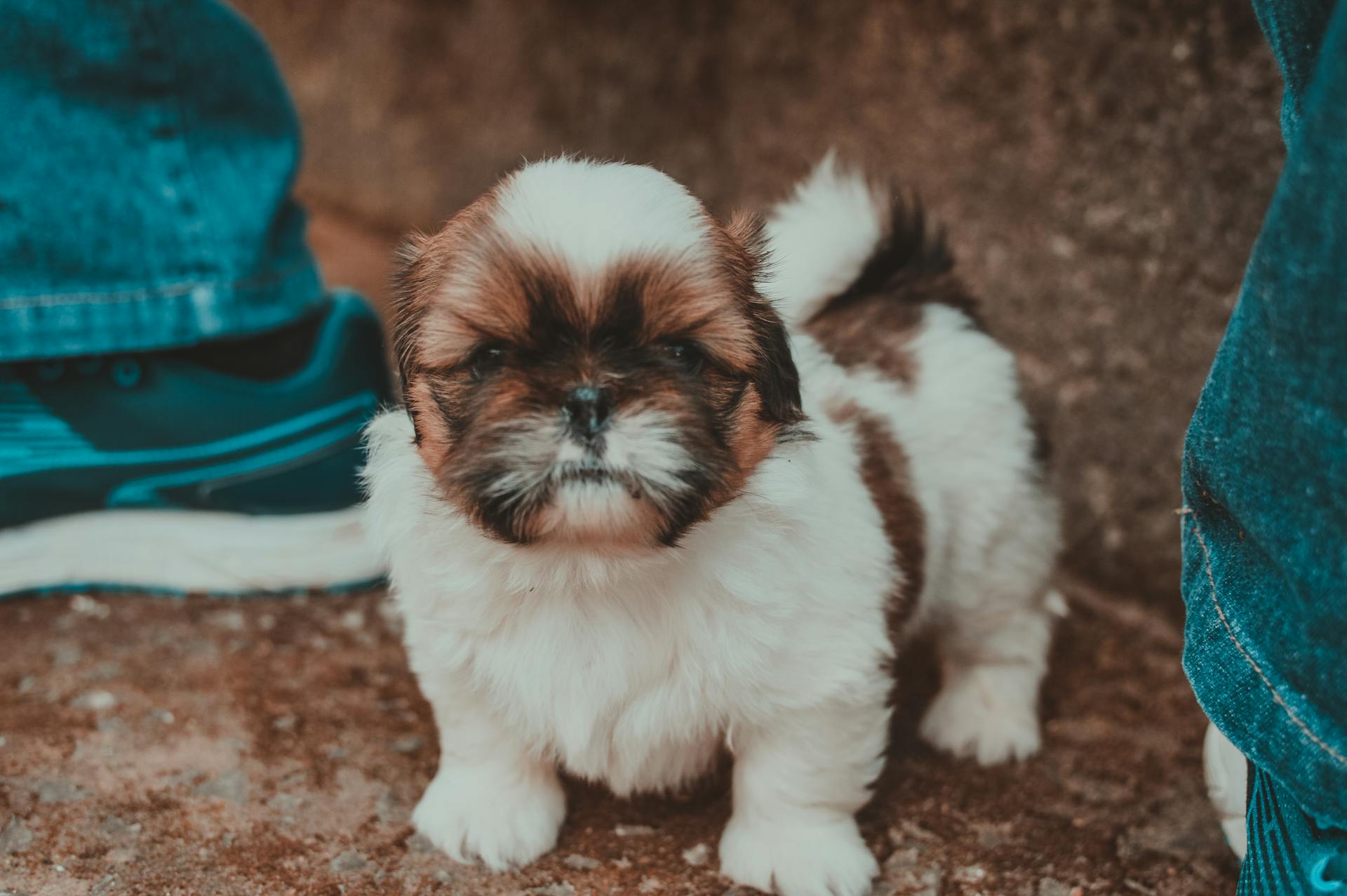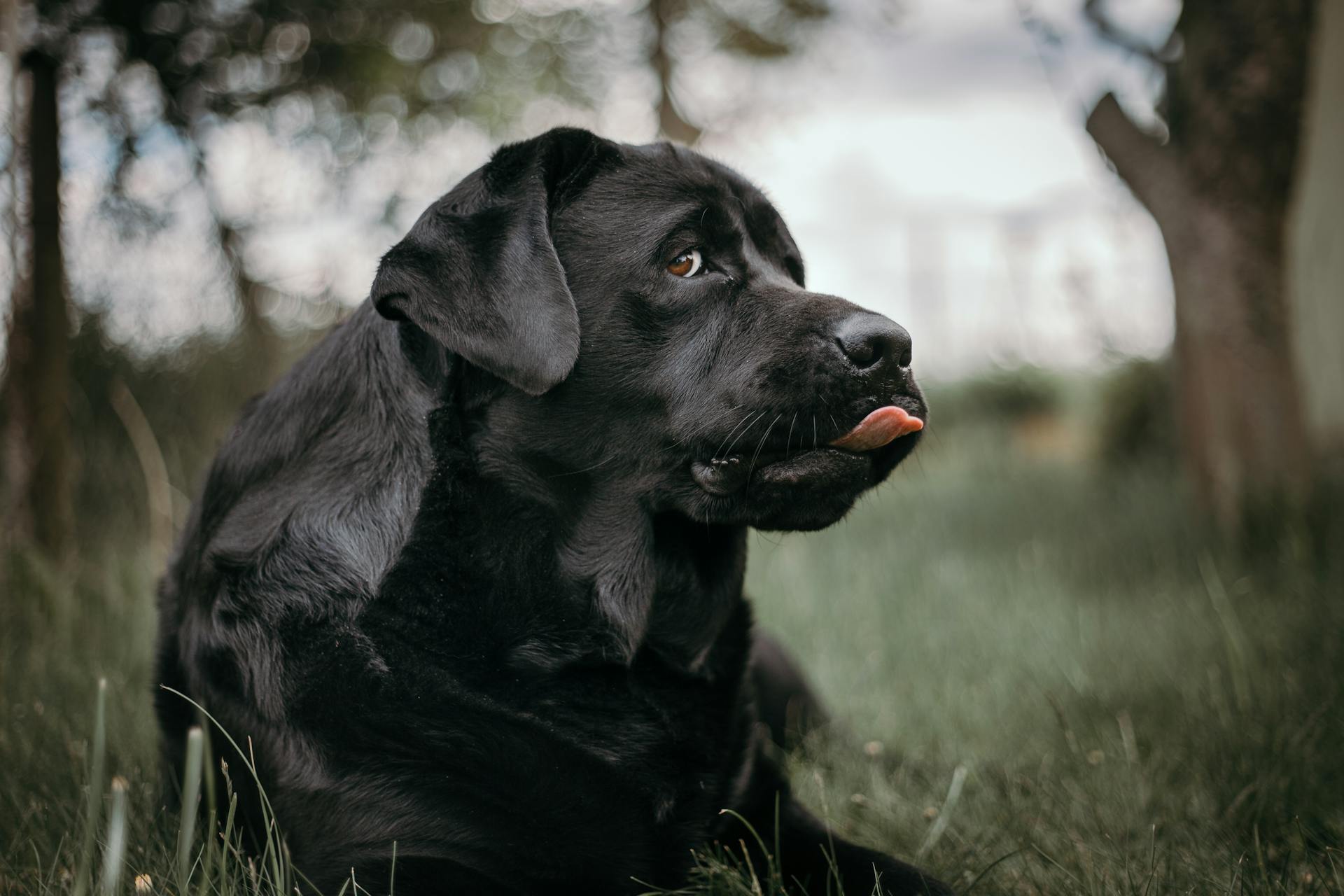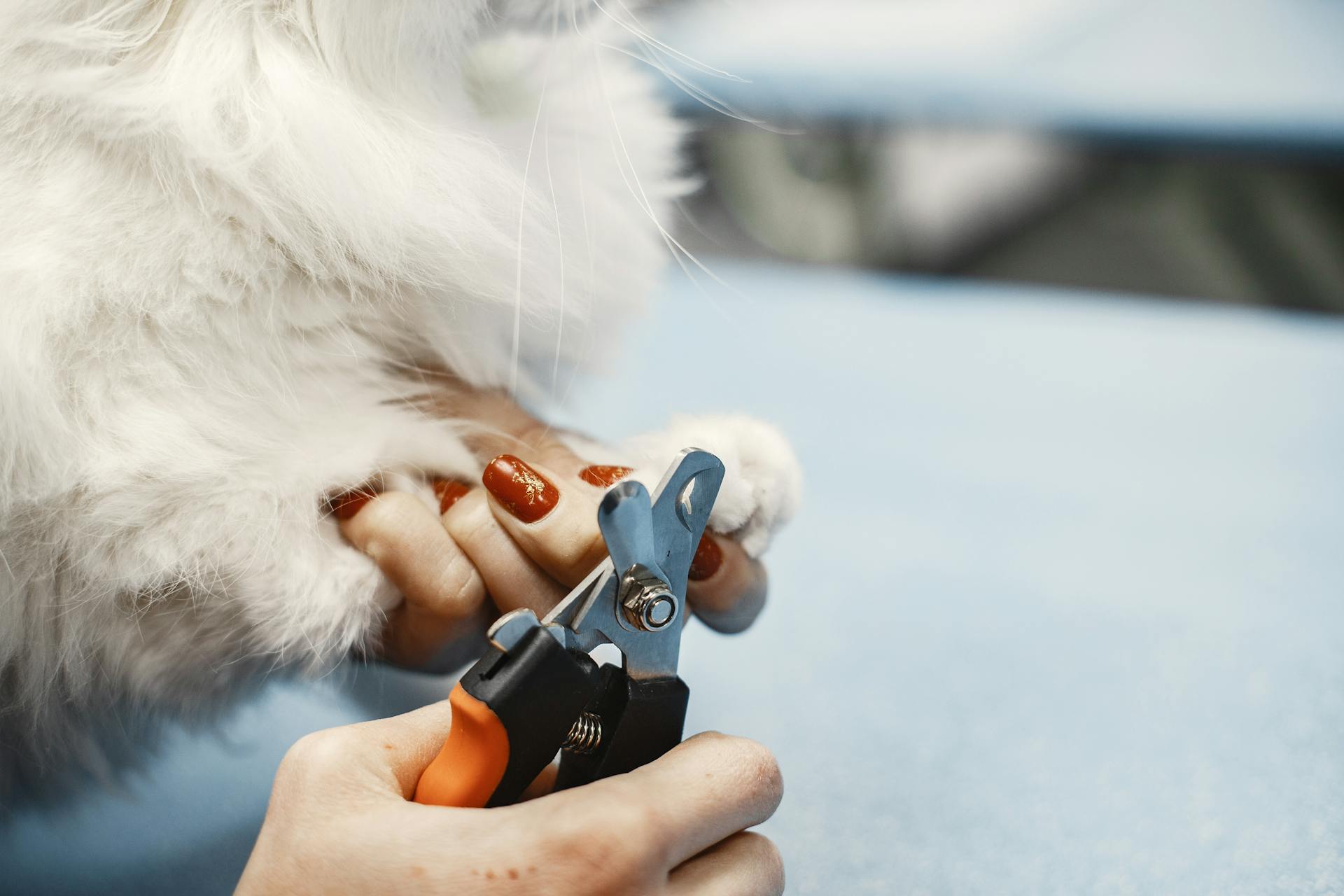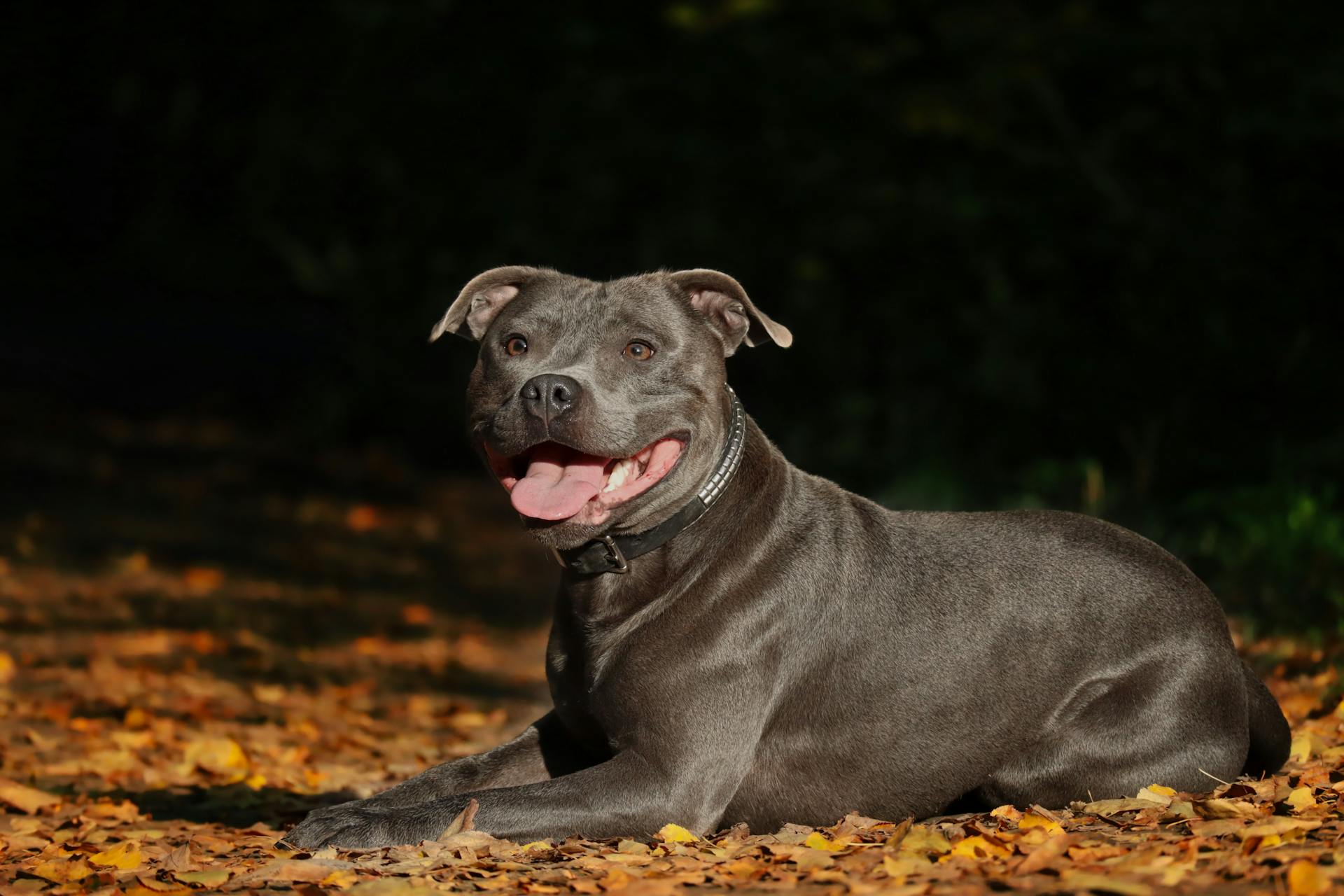
Living with Shih Tzus can be a delightful experience, but it does require some special attention to their unique needs.
Shih Tzus are a small breed, weighing between 9 and 16 pounds, and standing about 8-11 inches tall. They have a long, flowing coat that requires regular grooming.
Their friendly and outgoing personalities make them excellent family pets, but they can be wary of strangers, so socialization is key. With proper training and care, Shih Tzus can thrive in a variety of living situations.
Similar Dog Breeds
If you're looking for breeds similar to Shih Tzus, you might want to consider the Poodle or the Bichon Frise.
They're all small, friendly dogs with low-shedding coats, making them perfect for people with allergies.
The Poodle's high intelligence and trainability make it a great choice for first-time dog owners.
Like Shih Tzus, Bichon Frises require regular grooming to prevent matting and tangling of their fur.
Poodles are also known for their loyalty and affection towards their families.
Bichon Frises are playful and adaptable, making them a great fit for families with children.
Their small size also means they don't require a lot of exercise, making them perfect for city living.
Shih Tzus and Poodles both have a strong instinct to follow their owners around the house.
Bichon Frises, on the other hand, are more likely to get into mischief if left alone for too long.
Their gentle nature also makes them a great choice for families with older children or seniors.
Breed History
The Shih Tzu breed has a rich and fascinating history that spans over 2,000 years. They originated in Tibetan monasteries and were often given to Chinese royalty as gifts.
Their ancestors were first observed in tapestries dating back over 2,000 years, and they were highly regarded by Chinese dynasties. They were kept hidden from the public eye and lived in the royal court as companion dogs.
A different take: Shih Tzu Life Expectancy Human Years
The Shih Tzu was considered a "warmer" for its humans, often kept in sleeves or on their feet to help generate heat. This unique trait made them a beloved companion among royalty.
In the late 1800s, Empress Tzu Hsi was gifted a breeding pair of Shih Tzus by the Dalai Lama, and she started a strict breeding program to create her ideal "Imperial Dog." Unfortunately, the breeding program was discontinued after her death.
A pair of Shih Tzus eventually found their way to England in 1930, and the Shih Tzu Club of England formed in 1934. The Kennel Club (UK) officially recognized the Shih Tzu as a separate breed from the Lhasa Apso in 1940.
Today, Shih Tzus are beloved pets all over the world, and their unique history and temperament make them a cherished companion for many families.
Intriguing read: Breeding Shih Tzus
Training and Behavior
Shih Tzus are intelligent and eager to please, which makes them relatively easy to train. They respond well to positive reinforcement and reward-based training methods.
Training should start early, ideally from 8 weeks old, to avoid stubbornness and strong-willed behavior. Short training sessions of 5-10 minutes are best to keep your pup engaged and prevent boredom.
Shih Tzus love to learn and bond with their owners through training. They require exercise and mental stimulation to avoid unwanted behaviors, such as hyperactivity and barking. A combination of short walks and games can help expel excess energy.
Here are some tips for training your Shih Tzu:
- Keep training sessions short and fun.
- Use positive reinforcement and reward-based training methods.
- Start training early, ideally from 8 weeks old.
- Provide exercise and mental stimulation to prevent unwanted behaviors.
Training
Training a Shih Tzu can be a joy, as they love to learn and bond with their owners.
Shih Tzus are intelligent and eager to please, making them responsive to positive reinforcement and reward-based training methods.
Training should start early, ideally from 8 weeks old, to prevent their strong-willed nature from causing stubbornness.
Short training sessions of 5-10 minutes are recommended to keep your pup engaged and prevent boredom.
Puppies need plenty of physical and mental stimulation, so a combination of short walks and games is essential to expel excess energy and avoid unwanted behaviors.
Expand your knowledge: How to Train Shih Tzu
Shih Tzus love treats, but their favorite reward is their human's attention, so proper socialization is crucial to avoid possessiveness.
Socialization is especially important for Shih Tzus, as they can be wary of strangers and prefer getting to know people on their own terms.
Here's a rough guide to training your Shih Tzu:
Remember, consistency and praise are key to successful training, and patience is essential when dealing with a stubborn Shih Tzu.
Jealousy Issues
Shih Tzus aren't generally prone to fits of jealousy, but they can get a bit possessive at times.
It's essential to build trust gradually with newcomers in the household to avoid any issues later down the line.
Newcomers should be introduced slowly and with caution to prevent overwhelming your Shih Tzu and triggering possessive behavior.
Demonstrating extra love and understanding to your Shih Tzu can go a long way in ensuring a pleasant experience for everyone involved.
Shih Tzus thrive on attention and affection, so making sure they receive their fair share can help prevent jealousy issues.
Exercise and Physical Needs
Exercise and physical needs are crucial aspects of life with Shih Tzus. They don't require a high level of physical exercise, but a short daily walk and playtime with their human family or other dogs in the home is ideal.
Shih Tzus can get the "puppy zoomies" every once in a while, which is completely normal. Heavy exercise or exercise in warmer temperatures should be avoided to prevent health issues.
A daily walk outside of around 30 minutes or multiple shorter walks is a good starting point for a Shih Tzu. They'll also enjoy indoor playtime with interactive toys to increase mental stimulation.
Shih Tzus have a moderate energy level, meaning they need regular exercise to stay healthy. Their long coats can lead to overheating, so be sure to keep them cool.
Here are some exercise ideas for your Shih Tzu:
- Short walks
- Long walks
- Playing with balls
- Swimming
- Agility training
- Hide and seek with activity toys
- Mental stimulation with puzzle toys or games
Remember to monitor your Shih Tzu for heatstroke symptoms, which can include heavy panting, drooling, bright red tongue or gums, rapid pulse, and wide, panicked eyes.
Health and Wellness
Shih Tzus are a robust and long-lived breed, but like all dogs, they can be prone to certain health concerns. Their flat face can lead to breathing difficulties due to shortened airways, making them susceptible to brachycephalic syndrome.
Regular eye examinations are crucial to catch and manage ocular issues such as corneal ulcers, progressive retinal atrophy (PRA), and dry eye syndrome (keratoconjunctivitis sicca). These conditions can be painful and even lead to blindness if left untreated.
Dental problems are another concern for Shih Tzus, as their small mouths can lead to tooth overcrowding and make cleaning challenging. Regular dental care, including brushing and professional cleanings, can help prevent issues like dental decay and gum disease.
Skin allergies can cause itching, redness, and hair loss in Shih Tzus. Identifying and avoiding potential allergens, such as certain foods or environmental triggers, can help manage these issues.
Maintaining a healthy weight and providing regular, low-impact exercise can help reduce the risk of orthopedic problems like hip dysplasia and luxating patella (dislocated kneecap). Regular veterinary checkups and a balanced diet are also essential for keeping Shih Tzus happy and healthy.
Shih Tzus can become overweight if overfed and/or under-exercised, which can exacerbate other health issues. A balanced diet and regular exercise regimen are essential for keeping them happy and healthy throughout their lives.
Shih Tzus are susceptible to bacterial and viral infections, such as parvo, rabies, and distemper, which can be preventable through vaccination. Regular vaccinations and check-ups with a veterinarian can help protect your Shih Tzu from these infections.
Grooming and Care
Grooming a Shih Tzu requires daily brushing, especially of the top knot and beard hair, to prevent matting and tangling.
Their long and dense double coat needs consistent upkeep, which can be simplified by keeping it trimmed short.
A Pin comb, Pin brush, and Slicker brush are the best tools for the job.
Regular professional grooming is necessary to keep their coat clean and prevent matting.
Shih Tzus are prone to ear infections due to hair growing inside their ear canals, which can be prevented by routine cleaning with a vet-approved ear cleaner.
Exercise is not a major concern for Shih Tzus, but they do need regular walks and playtime to stay happy and healthy.
A 30-minute walk and at-home playtime are sufficient to keep them satisfied, and they love to be spoiled with attention and treats.
Recommended read: Shih Tzu No Fur
How to Groom an Animal
Grooming an animal requires regular attention to prevent matting and tangling of their coat.
Shih Tzus, in particular, have a long and dense double coat that needs daily brushing, especially of the top knot and beard hair.
Their coat is high maintenance and requires consistent upkeep to prevent matting.
Dirty coats are much more likely to tangle, so regular bathing is also necessary.
Many owners prefer to keep their Shih Tzu's coat shorter to simplify maintenance, which is best done through regular professional grooming.
Introducing your Shih Tzu puppy to positive grooming and handling while they're young will make their lifelong grooming needs easy for everyone.
The best brushes for a Shih Tzu include a pin comb, pin brush, and slicker brush.
Regular grooming will also help prevent bacteria and potentially harmful materials from building up in your dog's coat and skin.
Shih Tzus don't shed much, but their coat grows continuously and needs to be trimmed and brushed regularly.
They must be brushed at least a few times each week, but preferably daily, to prevent matting and tangling.
Routine professional grooming should be part of your budget to maintain the long hair coat or shave it into a cute Shih Tzu haircut periodically.
Recommended read: Are Shih Tzus High Maintenance
Ear
Ear infections are a common issue for Shih Tzus, caused by moisture getting trapped in their ears due to hair growing inside the ear canals.
This hair holds onto moisture, which can cause inflammation and infection by bacteria, fungus, or both. Regular cleaning is essential to prevent ear infections.
Cleaning your Shih Tzu's ears with a vet-approved ear cleaner can help reduce the chances of ear infections.
Nutrition and Diet
Feeding your Shih Tzu a high-quality diet is crucial for their overall health and well-being. This includes a well-balanced diet that meets their nutritional needs, which can be achieved by feeding them a dog food that meets the Association of American Feed Control Officials (AAFC) guidelines.
Shih Tzus often have sensitive stomachs, so it's essential to choose a food that's gentle on their digestive system. Regular visits to the vet can also help identify any dietary issues early on.
A Shih Tzu's dietary and nutritional needs will include quality dry food, which gives them all the necessary vitamins, minerals, and proteins they need to stay healthy. To avoid obesity, it's recommended to feed them a twice-daily, balanced adult small-bite diet.
For another approach, see: What Does Shih Tzu Eat
To determine the right amount of food for your Shih Tzu, consult with your veterinarian, who can help calculate the appropriate daily calories to avoid weight gain. When choosing a diet, select a small-breed food to allow for easy chewing and consider a dental-specific diet to lessen the risk of periodontal disease.
Here are some tips for feeding your Shih Tzu:
- Feed a high-quality diet appropriate for their age.
- Exercise your dog regularly, but don't overdo it at first.
- Choose a diet that's gentle on their digestive system.
- Consider a dental-specific diet to lessen the risk of periodontal disease.
Nutrition and Diet
Shih Tzus are prone to obesity, so it's essential to feed them a well-balanced diet and avoid too many treats throughout the day. A twice-daily, balanced adult small-bite diet is recommended.
You should consider feeding your Shih Tzu dry kibble instead of canned food to lessen the risk of periodontal disease, as dry kibble is abrasive and can remove some plaque buildup. A dental-specific diet can also be beneficial.
Shih Tzu puppies need to eat frequent meals (about three or four every day) to avoid risks of hypoglycemia (low blood sugar). High-fat, protein, and complex carbohydrate meals will lessen the risk of low blood sugar issues.
Intriguing read: Shih Tzu Day
Your veterinarian can help to calculate the appropriate daily calories your pet should eat to avoid weight gain. When choosing a diet for your Shih Tzu, choose a small-breed food to allow for easy chewing.
If your Shih Tzu is eating a dog food that meets the Association of American Feed Control Officials (AAFC) guidelines, they shouldn’t need any extra supplementation unless recommended by your veterinarian. Dog supplements that can support the health of this breed include omega fatty acids, which are good for your Shih Tzu’s heart, brain, skin, and joints.
A Shih Tzu's dietary and nutritional needs will include quality dry food, which gives them all the necessary vitamins, minerals, and proteins they need to stay healthy. Shih Tzus often have sensitive stomachs, so it's crucial to choose a high-quality food that meets their specific needs.
Here are some general guidelines for feeding your Shih Tzu:
- Feed a high-quality diet appropriate for their age.
- Avoid giving them people food.
- Feed a small-breed food to allow for easy chewing.
- Consider a dental-specific diet to lessen the risk of periodontal disease.
- Don't overfeed, as Shih Tzus are prone to obesity.
Remember, every dog is different, so it's essential to work with your veterinarian to determine the best diet for your Shih Tzu based on their individual needs and health status.
Spay or Neuter
Spaying or neutering your Shih Tzu can decrease the likelihood of certain types of cancers.
This surgery also eliminates the possibility of your pet becoming pregnant or fathering unwanted puppies.
Spaying or neutering gives us a chance to identify and address some diseases your dog is likely to develop, like hip problems or dental issues.
Routine blood testing before surgery helps us identify and take precautions against common problems that increase anesthetic or surgical risk.
We'll discuss the specific problems we'll be looking for when the time arrives.
Socialization and Family
Shih Tzus are known for being outgoing and social, so proper socialization from a young age is essential. They thrive on interaction and attention from their family.
As a social breed, Shih Tzus do well with children, especially if they're introduced and socialized properly as puppies. This helps set them up for success in the long run.
Young children and dogs should always be supervised when interacting, and it's helpful for a dog to have their own "safe space" where they can retreat when needed.
Proper socialization also allows Shih Tzus to enjoy the companionship of other animals in the home, as long as they've been introduced correctly.
In fact, Shih Tzus make a great addition to any family, including households with kids, due to their playful and affectionate nature.
A fresh viewpoint: When Do Shih Tzus Stop Growing
Veterinary Care and Maintenance
Shih Tzu do not require a great deal of exercise, but they do need regular attention and playtime to be happy.
As a responsible pet parent, it's essential to perform routine grooming to keep your Shih Tzu clean and healthy.
Shih Tzu need to stay at a healthy weight, and regular check-ups with your veterinarian can help monitor their weight and overall health.
If you notice any unusual changes in your Shih Tzu's behavior or physical condition, don't hesitate to call your veterinarian for an appointment.
Here are some signs that may indicate your Shih Tzu needs veterinary care:
- Change in appetite or water consumption
- Tartar build-up, bad breath, red gums, or broken teeth
- Itchy skin (scratching, chewing, or licking); hair loss
- Lethargy, mental dullness, or excessive sleeping
- Fearfulness, aggression, or other behavioral changes
- Lumps or bumps – regardless of size
- Slow or stunted growth; sometimes seizes after eating
- Drinks and urinates more, eats more; potbelly, poor coat
Frequently Asked Questions
Can Shih Tzu be left alone all day?
No, Shih Tzus should not be left alone for more than 8 hours, and ideally no more than 6 hours, to ensure their physical and emotional well-being
Is a Shih Tzu a good house dog?
Yes, Shih Tzus can make great house dogs for families due to their gentle and affectionate nature. However, they require regular exercise and socialization to thrive in a home environment.
What are the pros and cons of a Shih Tzu?
Shih Tzus are friendly, loyal, and low-maintenance companions, but can be stubborn at times. They make great house dogs for those who want a relatively easy-going pet.
Featured Images: pexels.com


